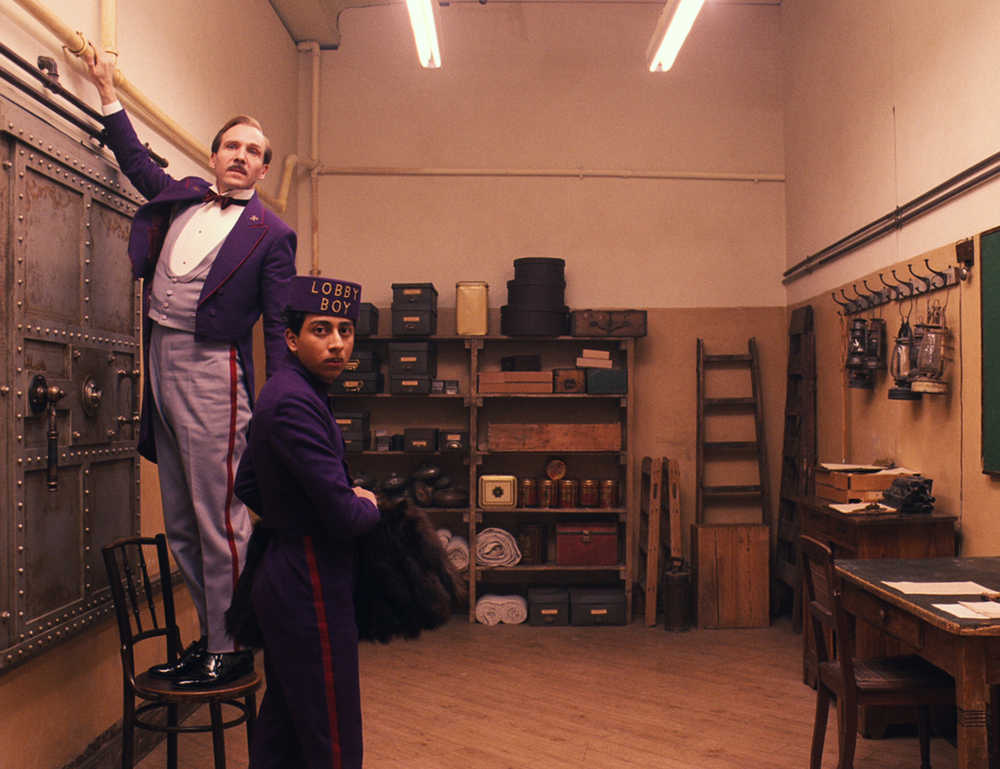“The Grand Budapest Hotel”
Fox Searchlight Pictures
1 hour, 40 minutes
Wes Anderson is a master of quaint, meticulously crafted melancholy. Up until now, however, his films have really emphasized the melancholy. One of Anderson’s major themes is the relationship of a father to his children, and typically this plays out with more than a tinge of sadness. From “The Royal Tenebaums” to “Rushmore” to “The Life Aquatic,” Anderson’s films are nearly always meditations on the many ways a man can disappoint his offspring. These movies are always beautiful, very funny, gorgeous to look at, and, at precise moments, heartbreaking.
This latest, “Grand Budapest,” has all of the former elements, but this time the emphasis is on the quirky, the funny, and the quaint while the melancholy is more of an accent.
At the center of the madcap collection of characters that make up the “Grand Budapest” is M. Gustav, played with comic zeal by Ralph Fiennes, concierge of the titular hotel in the fictional Eastern European republic of Zubrowka.
The year is 1932 and all of Europe is about to be consumed in the fires of world war, but Gustav nonetheless runs his establishment with an iron fist. Or possibly a velvet glove. For, in addition to efficiently managing a full staff, Gustav also efficiently manages to find his way into the hearts, and the beds of his most important, and most aged, female guests.
When one of those guests, a wealthy dowager countess named Madame D., is found murdered, the world of the Grand Budapest, in tandem with the rest of the continent, is turned upside down. Gustav is on the run, and on the case of solving the murder and clearing his name or die trying. In tow is Zero Moustafa, lobby boy in training and Gustav’s closest confident and ally.
Throughout the production, there are a score of famous faces popping up here and there, often for no more than a scene or two. Bill Murray, Tilda Swinton, Bob Balaban, Owen Wilson, and Harvey Keitel are just a few of the marvelously talented cast Anderson has compiled for the film.
With only slightly more screen time, “Budapest” also includes stars such as Jude Law, F. Murray Abraham, Edward Norton, Jeff Goldblum, Willem Dafoe, Saorse Ronan and Adrian Brody, all spectacular and all very funny. It must be fun to work for Wes Anderson — show up, film for a few days, take a peek behind the scenes of this elaborate jewel box, and get paid for it.
More impressive than all of the above stars, however, was the introduction of young Tony Revolori as Zero, who essentially acts as the narrator as well as foil to father figure Gustav. Revolori, mostly known for one-off television performances, nails the patented Wes Anderson dialect perfectly. Deadpan, earnest, given to poetic flourish, he delivers his lines brilliantly and gives heart and soul to his weary doppelgänger.
As I mentioned, “Budapest” is much more fun than most of Anderson’s movies, treating us to a wacky plot, hilarious dialogue and a particularly silly/thrilling downhill ski chase. Also amped up is the director’s penchant for elaborately detailed production design.
You could go back and see “Budapest” a second time and pay absolutely no attention to the plot, only taking in the incredible, almost Byzantine level of detail put into the ephemera of each shot.
Like many of Anderson’s films, “Budapest” is rated R — mostly for language, though there is some brief sex and brief violence
The language though rough, is used well, as a comic beat rather than in a gratuitous manner.
You get the sense watching this film as well as any of the director’s others, that absolutely nothing is accidental or ad libbed — that no single look or gestures has been left to chance.
I’ll definitely see this movie again, likely adding it to my collection of Wes Anderson masterpieces.
Grade: A
“The Grand Budapest Hotel” is rated R for language, violence, brief nudity and sexual situations.
Chris Jenness is a freelance graphic designer, artist and movie buff who lives in Nikiski.

